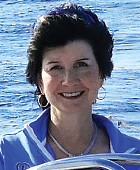The Secrets for Managing It All: An Introduction to a Smooth-Sailing Life
Abstract
This article is part of series on physician wellness spearheaded by APA President Anita Everett, M.D.

After a sleep-starved week of call interspersed with mounting tenure-track demands, as well as the demands of being a young mother and wife, I collapsed onto the family room sofa, burying my face in the pillows.
“I can’t do this anymore,” I said. “I’m capsizing.”
In response, my husband, a sailor, offered a sailor’s solution. “Reef in your sails, my love,” he said.
What he meant was that it was time for me to pull down my sail volume so I could remain upright while the winds were high. In this way, I might prevent being blown over.
My husband’s advice was a game changer. From that time onward, I began to look to sailing as a metaphor for meeting professional and life challenges and avoiding burnout. In time I developed what I call the “nautical metaphor,” and a trademarked message, Smooth Sailing Life, for achieving emotional well-being, life balance, meaning, and fulfillment. In talks to faculty, trainees, and medical students, I have become passionate about sharing the nautical metaphor. Here are a few of its lessons:
You are a sailboat, a craft that must carry you for a lifetime. Take care of it! No matter what you do, this lifetime is finite. We all will die. The body of your boat (the hull) represents both your physical body and your brain. Everything you will accomplish in this lifetime depends on its remaining seaworthy, watertight, and strong. Periodically bring your boat into the maintenance bay to keep it in top form. Provide it with the highest quality, most durable nutrition (building materials) because you are literally what you eat as your cells replenish and replace one another. Exercise regularly to maximize its strength and endurance so that it is at its best—strong, healthy, and fit. Rest it to ensure its efficiency.
Be selective about what you allow to fill your sails. There are only 24 hours each day; give yourself permission to love, play, rest, and be creative and to say “no” to tasks that squander your time. Winds that fill your sails are your tasks, responsibilities, and activities. The vast majority of psychiatrists and other physicians find themselves managing gale-force winds for much of their lives and being pulled in too many different directions simultaneously.

Highly esteemed, successful physicians possess an impressive drive to work hard, to master the most difficult challenges, and to demand perfection from themselves and others. This core drive arises from family-of-origin teachings and from medical training where these traits are both demanded and revered. Rest, play, or off-the-grid vacation breaks are not valued and may be disparaged. The technique for managing stress and anxiety, we physicians are taught, is to work harder.
These deeply entrenched patterns aren’t easy to change. Burnout is a wake-up call that it is time to reexamine them and to incorporate the vital factors of rest, play, creative outlets, and loving relationships in your life.
With just 24 hours in a day, it is critically important to selectively accept winds aligned with what you value most. If you are a people-pleaser and struggle to say “no” when asked to accept a new task or responsibility, try to arrange, at least, to give yourself time before responding—institute a 24-hour rule while you carefully consider the best response. After a period of reflection, you may find it easier to say “no” and discover how that empowers you to invest your time in activities you value most.
What about those times you find yourself in the midst of gale-force winds? That’s when it’s time to triage, delegate, and ask for help—and be aware you may also have to accept that things will get done their way. Hang on for the exhilarating ride, and don’t take on more until you are no longer at risk of capsizing.
It’s not possible to have smooth sailing every day! Accept imperfection and maintain a healthy sense of humor! A few years back, while serving as the attending over the consultation/liaison psychiatry service leading rounds in the general hospital, our team social worker, Julie, quietly slipped me an index card with a neatly written note. “Resources for the miss-matched.”

Puzzled, I continued to read down her note, “Payless Shoe Source,” “DSW Designer Shoes,” “Paul’s Shoes.” Each business included a phone number along with an accompanying address designating its proximity to the medical center. She watched me with a mischievous twinkle in her eye; the team was intently observing it all. Confused, I ran through our last patient’s history. I couldn’t recall any discussion of a need for shoes?
Glancing down to quickly review my notes, I caught a glimpse of my own shiny shoes. I blinked. One was black and the other blue!
Needless to say, life is messy managing as a physician, wife, and mother of two little ones. It’s good to laugh at our imperfections in the company of those we cherish. Maintaining a sense of humor and working with a beloved team who is playful and supportive are sustaining and refreshing.
Stay focused on what really matters in life—namely, relationships and caring about one another. Some of the closest, most cherished friendships are forged during our roughest days at sea. ■
Worley’s website, “Smooth Sailing Life,” can be accessed here.



